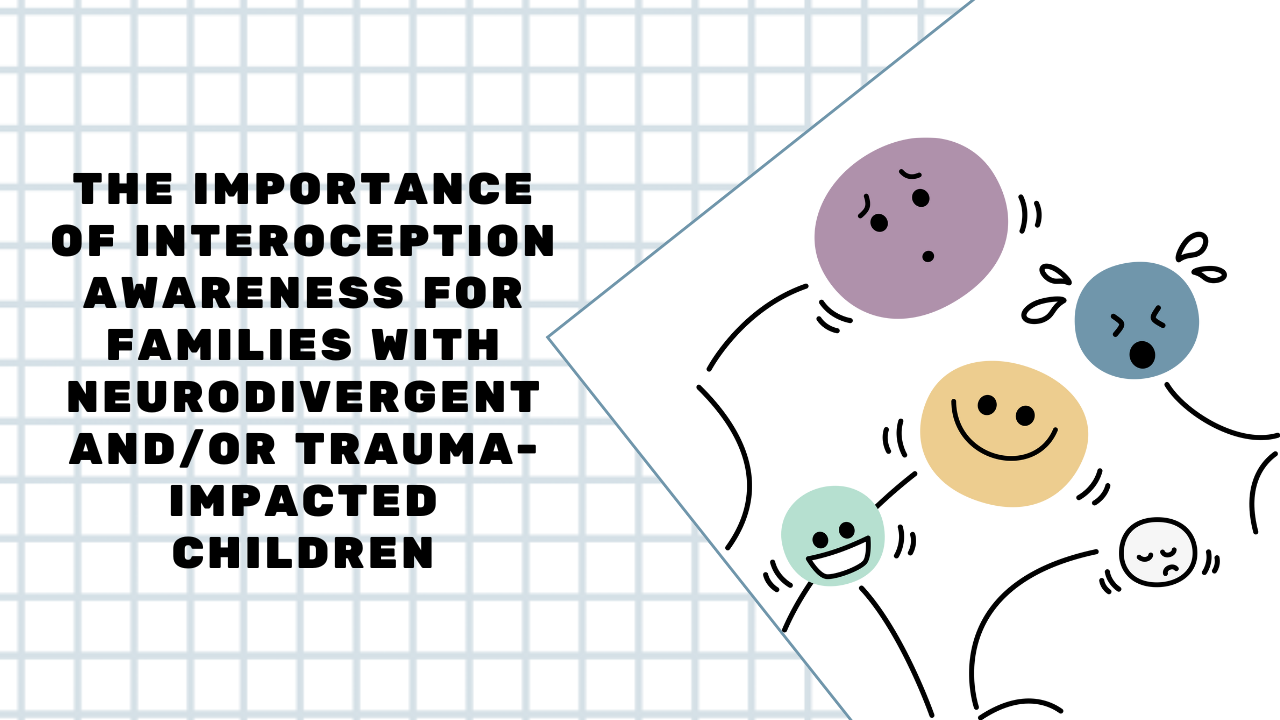
The Importance of Interoception Awareness for Families with Neurodivergent or Trauma-Impacted Children
Mar 07, 2025In today's fast-paced world, cultivating a sense of safety and connection within the home is more crucial than ever. For families with children who are neurodivergent or have experienced trauma, the need for an internal sense of safety becomes a central focus. One powerful approach to achieving this is through developing interoception awareness within the entire family unit.
What is Interoception?
Interoception is often referred to as the "eighth sense"—our ability to perceive and understand internal signals from our bodies. These signals include sensations related to hunger, thirst, temperature, and emotional states. When individuals can accurately interpret these signals, they are better equipped to manage their emotions, reduce stress, and communicate their needs effectively.
Why is Interoception Important for Neurodivergent and Trauma-Impacted Children?
Children who are neurodivergent, such as those with autism, ADHD, or sensory processing differences, often experience heightened or diminished interoceptive signals. Similarly, children who have experienced trauma may struggle with interoception due to the way trauma can disrupt the brain and body's communication. This can lead to challenges in recognising physical needs and regulating emotions, which in turn affects their behaviour and sense of safety.
Developing interoception awareness helps these children gain a better understanding of their internal experiences. This can reduce anxiety, improve self-regulation, and support them in navigating the world with a greater sense of control and comfort.
The Role of the Family in Building Interoception Awareness
For interoception awareness to be truly effective, it is important for the whole family to engage in this process. When parents and siblings also develop their interoceptive skills, it creates a shared language of understanding and empathy. This shared awareness enhances communication, reduces misunderstandings, and builds a nurturing home environment where everyone feels safe to express themselves.
Parents who model interoceptive awareness can demonstrate healthy coping strategies and normalise the experience of discussing internal states. For example, sharing how they manage stress by recognising tightness in their chest or noticing when they need a break can provide children with concrete examples to follow.
Practical Ways to Build Interoception Awareness at Home
- Mindful Check-Ins: Regularly pause as a family to notice how your bodies feel. Use prompts like, “What sensations do you notice in your body right now?”
- Name It to Tame It: Encourage everyone to label their feelings and sensations. This practice can reduce the intensity of emotions by bringing them into conscious awareness.
- Create Sensory-Friendly Spaces: Designate a calm area in the home where any family member can retreat when they need a sensory break.
- Model Self-Awareness: Share your own interoceptive experiences aloud, demonstrating that it is safe to express and explore internal feelings.
- Engage in Sensory Activities: Activities like yoga, breathing exercises, and using sensory tools can help enhance interoceptive awareness.
Conclusion: Building a Safe and Supportive Home
For families with neurodivergent or trauma-impacted children, developing interoception awareness is not just beneficial—it is transformative. It fosters an environment where all family members feel safe, valued, and connected. Through understanding and responding to internal signals, families can build a resilient foundation that supports both individual well-being and collective harmony.
By prioritising interoception awareness, families can navigate the complexities of neurodiversity and trauma with compassion, empathy, and an unwavering sense of safety. The result is a home where every member feels at ease, and where growth and healing are not just possible but naturally supported.
To become more aware check out our Family Regulation Toolkit available for immediate download.
Kate xx

